The Great Dictator: The film that dared to laugh at Hitler
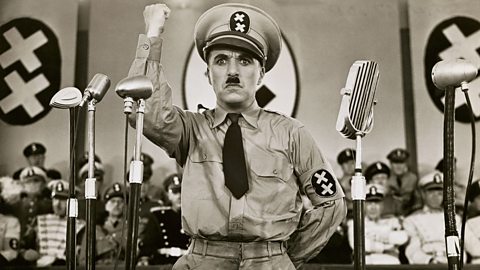 Getty Images
Getty ImagesEighty years ago, Charlie Chaplin skewered the Nazis in his satire The Great Dictator. Nicholas Barber looks at how the film has wider relevance today.
It's hardly surprising that Charlie Chaplin's The Great Dictator was banned in Germany, and in every country occupied by Germany, in 1940. A film that mocked Adolf Hitler was never going to be the Nazi High Command's first choice of Friday night entertainment. The more surprising thing, from today's perspective, is that Chaplin was warned that it might not be shown in Britain or the US, either. Britain's appeasement policy kept going until March 1939, and the US didn't enter World War Two until December 1941, a year after The Great Dictator was released, so when Chaplin was scripting and shooting the film – his first proper talkie – colleagues at the studio he co-owned were afraid that no government would let it be seen.
"I began receiving alarming messages from United Artists," he wrote in his autobiography. "They had been advised... that I would run into censorship trouble. Also the English office was very concerned about an anti-Hitler picture and doubted whether it could be shown in Britain. More worrying letters came from the New York office imploring me not to make the film, declaring it would never be shown in England or America."
But Chaplin wouldn't be dissuaded. He knew that The Great Dictator was worth making, and, sure enough, it was a box office smash: 1941's second biggest hit in the US. On the 80th anniversary of the film's release, Chaplin's prescience is even more startling. The Great Dictator is a masterpiece that isn't just a delightful comedy and a grim agitprop drama, but a spookily accurate insight into Hitler's psychology. "He was a visionary," said Costa-Gavras, the Greek-French doyen of political cinema, in a making-of documentary. "He saw the future while the leaders of the world couldn't see it, and remained on Hitler's side."
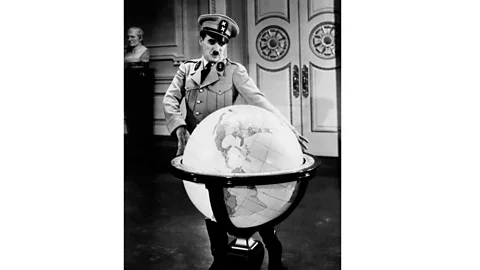 Getty Images
Getty ImagesWhat's even more remarkable is that Chaplin didn't just capture Hitler, but every dictator who has followed in his goose steps. "It resonated at the time, and it continues to resonate," says Simon Louvish, the author of Chaplin: The Tramp's Odyssey. If you want to see a crystalline reflection of the 21st Century's despots, you'll find it in a film that came out 80 years ago.
A serious message
By the time Chaplin made The Great Dictator, he had long despised the Nazis, and vice versa. A German propaganda film denounced him as one of "the foreign Jews who come to Germany" – never mind that he wasn't Jewish – while the US press nicknamed him "The 20th-Century Moses" because he funded the escape of thousands of Jewish refugees. When he started work on the film initially titled "The Dictator", he was "a man on a mission", says Louvish. "Some of his contemporaries, like Laurel and Hardy, just wanted to make funny movies and make money. But Chaplin was very serious about what he wanted to say. The Great Dictator wasn't just a film. It really was something that was required."
Still, Chaplin was motivated by more than humanitarianism. He was also fascinated by his uncanny connections to Hitler, who was born in the same week as he was in April 1889. A comic song about the Führer, recorded by Tommy Handley in 1939, was entitled "Who Is That Man...? (Who Looks Like Charlie Chaplin)". An editorial in The Spectator magazine, marking the men's 50th birthdays, explored the theme in more depth: "Providence was in an ironical mood when... it was ordained that Charles Chaplin and Adolf Hitler should make their entry into the world within four days of each other... The date of their birth and the identical little moustache (grotesque intentionally in Mr Chaplin) they wear might have been fixed by nature to betray the common origin of their genius. For genius each of them undeniably possesses. Each has mirrored the same reality – the predicament of the 'little man' in modern society. Each is a distorting mirror, the one for good, the other for untold evil."
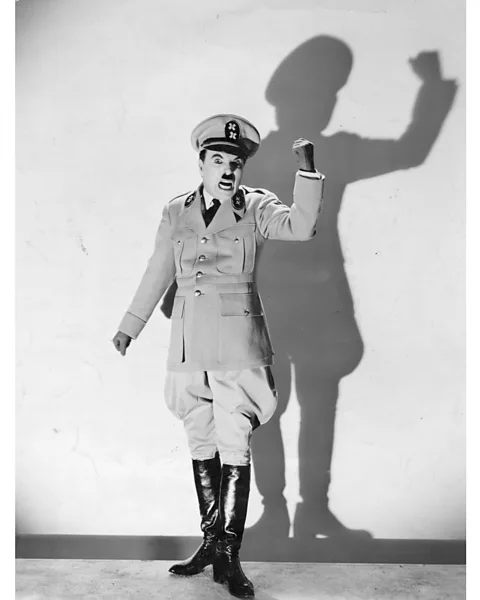 Getty Images
Getty ImagesIt was Alexander Korda, the Hungarian-born British producer, who suggested that Chaplin should capitalise on the similarity, but it was obvious that an entire film of the former "Little Tramp" as a frothing tyrant would be too much for audiences to take, and so Chaplin opted to play two roles. He would be Adenoid Hynkel, the autocratic ruler of Tomainia, and he would be a humble, amnesiac, unnamed "Jewish Barber". An opening caption announces: "Any Resemblance Between Hynkel the Dictator and the Jewish Barber is Purely Co-Incidental."
Inevitably, this coincidental resemblance results in the two men being mistaken for one another, but not until the film's climax. The Barber is hustled onto a stage where his doppelganger was due to make a speech, and Chaplin delivers a sincere five-minute plea for decency and brotherhood that either spoils the film (in the view of the Pulitzer-winning critic Roger Ebert) or elevates it further still: "More than machinery, we need humanity! More than cleverness, we need kindness and gentleness!" For most of the running time, though, Chaplin cuts between the two characters' separate storylines, so that we can never forget either the victims of Nazi persecution or the man responsible for it. In the ghetto, the gentle Barber romances a defiant washerwoman, Hannah, who is played by Chaplin's wife at the time, Paulette Godard. (The scene in which Storm Troopers pelt Hannah with the tomatoes they have just stolen from a grocer's shop is the most infuriating portrait of cowardly bullying imaginable.) Meanwhile, in his palace, Hynkel – aka the Phooey rather than the Führer – frets about how to outmanoeuvre his Mussolini-like rival, Benzino Napaloni.
Both strands are so bold that they make most big-screen satire seem feeble in comparison. In Ernst Lubitsch's To Be or Not to Be, which came out in 1942, the word "Jew" is never spoken. Chaplin isn't so coy. Central to the ghetto scenes is the fact that "Jew" has been daubed on all of the windows in capital letters. When the Barber tries to wipe off the paint, he is chased by Storm Troopers in sequences that recall Buster Keaton dodging crowds of policemen in Cops. But in this case, one such sequence concludes with the Storm Troopers throwing a noose around the Barber's neck and hanging him from a lamp post. He is saved at the last second, but still, the speed with which Chaplin flips between slapstick and horror is breathtaking. It's also worth noting that the Storm Troopers don't have German accents – or even upper-crust English accents, as so many Nazis would in later Hollywood films. Most of them sound American.
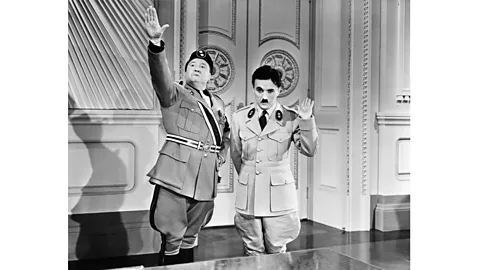 Getty Images
Getty ImagesIn Hynkel's palace, the comedy is lighter and more farcical. Chaplin sketches a caricature of European political shenanigans in the zany tradition of the Marx Brothers' Duck Soup. (Jack Oakie's Napaloni is the kind of hearty Italian wise guy played by Chico Marx.) The dictator's crimes aren't ignored: on a whim, Hynkel orders 3000 protesters to be executed. But Chaplin concentrates on the character's vanity, stupidity and childishness. In one throwaway visual gag, the towering filing cabinet behind his desk is shown to have no drawers at all, but several concealed mirrors instead. When Napaloni pays a state visit from the neighbouring country of Bacteria, the two men compete to have the higher chair while they are being shaved, and to have the more flattering position when they are being photographed.
The message is that Hynkel is not a brilliant strategist or a mighty leader. He is an overgrown adolescent – as demonstrated in the sublime set piece in which he dances with an inflatable globe, dreaming of being "emperor of the world". He is an insecure buffoon who bluffs, cheats, obsesses over his public image, manhandles his secretaries, revels in the luxury of his extravagant quarters, and reverses his own key policies in order to buy himself more time in power. "To me, the funniest thing in the world is to ridicule impostors," wrote Chaplin in his autobiography, "and it would be hard to find a bigger impostor than Hitler."
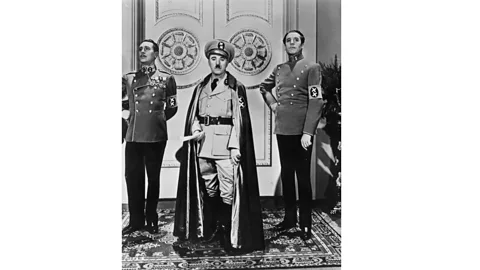 Getty Images
Getty ImagesHynkel's anti-Semitic rants (consisting of cod-German punctuated by shouts of "Juden") are terrifying, but there is no conviction behind them, just a desperate need to distract the Tomainians from his economic failures. As his urbane sidekick and Goebbels substitute, Garbitsch (Henry Daniell), says: "Violence against the Jews might take the public's mind off its stomach."
The film has been accused of trivialising Nazi atrocities. Chaplin himself said, in his autobiography, "Had I known the actual horrors of the German concentration camps, I could not have made The Great Dictator; I could not have made fun of the homicidal insanity of the Nazis." But he isn't just making fun of Hitler – as Mel Brooks did in The Producers in 1967 – he is making an astute point about the fragile egos of male world leaders.
Think of today's dictators and would-be dictators, in any country, and you can spot all the juvenile qualities that Chaplin identified: the fetish for photo opportunities, the lavish lifestyles, the policy flip-flops and the crackpot schemes, the self-aggrandising parades and the chests full of medals: Billy Gilbert's Herring, ie. Göring, has so many medals pinned to his uniform that Hynkel has to turn him sideways to find room for the latest addition. Hitler was at the peak of his power when The Great Dictator was being made, but Chaplin had already recognised that, as with every subsequent dictator, his villainy was bound up with his immaturity.
According to biographer Jürgen Trimborn, much of the film was inspired by a screening of Leni Riefenstahl's pro-Hitler documentary, Triumph of the Will, at the New York Museum of Modern Art. While other viewers were appalled, Chaplin roared with laughter at the ridiculous spectacle. This attitude sustained him when he was urged to abandon The Great Dictator. "I was determined to go ahead," he wrote in his autobiography, "for Hitler must be laughed at."
Love film and TV? Join BBC Culture Film and TV Club on Facebook, a community for cinephiles all over the world.
If you would like to comment on this story or anything else you have seen on BBC Culture, head over to our Facebook page or message us on Twitter.
And if you liked this story, sign up for the weekly bbc.com features newsletter, called The Essential List. A handpicked selection of stories from BBC Future, Culture, Worklife and Travel, delivered to your inbox every Friday.
